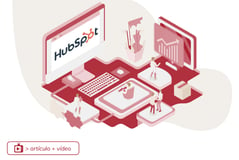Index Content
CRM is an acronym for Customer Relationship Management, which is a tool used to manage a company's relationships with its customers.
What is a CRM
Specifically, it is software with services dedicated to helping companies manage their relationships with customers effectively, through all kinds of channels, direct and indirect. However, it is not just the software itself, but also the entire strategy that is built around it. Through this business strategy, which encompasses sales, marketing and customer service, the company seeks to optimise the long-term relationship with customers.
CRM is yet another example of how marketing places the customer at the heart of its strategies and visions, which is why it is necessary to have a customer-centric culture and philosophy.
CRM stores information about customers, their personal data (name, address, telephone number), their objectives, and their relationship with the company (visits to the site, established contacts such as calls or emails). The information collected is managed and classified to create an optimal customer communication strategy. The tool is continuously updated, adding any new information about customers and detecting trends in their actions that can help the sales process. It uses both customers and prospects, leads and promoters.
With this information, the CRM is able to detect sales opportunities, weaknesses and strengths, and measure the results obtained by the different sales processes and strategies. The databases and platforms on which the CMR is based are accessible to all staff, so that the whole team can work with updated and automated information.
There are almost as many types of CRM as there are companies and choosing the most suitable one for your company is a fundamental and very personal task. You should choose the one that best suits your company's needs, organisation and applications. However, there are three main types of CRM: operational, analytical and collaborative.
Operational CRM:
The operational CRM is the application oriented to the customer and to create an efficient and automated sales system. They are the easiest CRM to use and the simplest, which is why they tend to be the most common, especially in small teams.
The operational CRM is responsible for automating the sales force, commercial marketing and customer service. It involves customer service: the operational CRM is responsible for interacting with customers throughout the buyer's journey and the sales funnel, i.e. from the customer's first contact with the company to the purchase decision or conversion into a lead, customer or promoter. Among the actions carried out by an operational CRM are email marketing campaigns and after-sales service.
This software also takes care of order management and accounting as well as marketing and sales automation and can also carry out a small ROI (rate of return) calculation and the effects of SEO strategies.
It is a CRM that is very easy to integrate with the finance and human resources sectors.
Analytical CRM:
Analytical CRM essentially deals with data processing as it relates to your relationship with customers. It contains data storage and processing programmes to understand customer behaviour. It also contains algorithms through which the collected data is analysed and interpreted.
Part of the analytical CRM is in charge of mechanically collecting the interactions between the customer and the company, and then analysing them. Based on this previous data, the CRM is able to discover trends and patterns in these contacts that establish behaviours, archetypes and stereotypes for customers or prospects, for whom a personalised strategy can be developed from this point. Finally, a last application of this software is to create sales and marketing strategies based on all of the above.
It is a CRM that is highly centralised in decision making based on the elements present in the databases and the results of its analysis. It is, therefore, a software that becomes more efficient over time as it better understands the behaviour of customers towards the company. As with other algorithms, the longer they observe the behaviour of a user, the better they predict their tastes and actions.
Its greater complexity makes it a more expensive and complex CRM, but also more efficient and responsive.
It is a type of CRM that is very interesting for personalising the use of data as much as possible.
Collaborative CRM:
Collaborative CRM focuses on customer communication in the most omnichannel sense possible, as well as on internal company communication.
It focuses, as we said, a large part of its efforts on multi-channel communication with customers and on the way in which the consumer accesses all the "points of contact", the means of communication through which the customer can access the company. We are referring, for example, to e-mail, fax, website, etc.
As part of its functions, it accounts for all interactions between both parties, dividing them by department, recording the duration, the person who answered the call or the email, etc. It also analyses and optimises the company's internal communication and the management of the different channels.
CRM is a systematic strategy in which the company places its trust thanks to the faith of automation. However, the same systematisation that is used to evaluate situations and make sales decisions shows how strict and rigorous its evaluations are, and this does not mean that the personal criteria of workers and employers should be ignored, nor should all trust be placed in a blind faith in the results shown by CRM, without taking into account human criteria.
Examples of CRM are: Hubspot, Salesforce, Google's G Suite, Freshworkso Holded.




